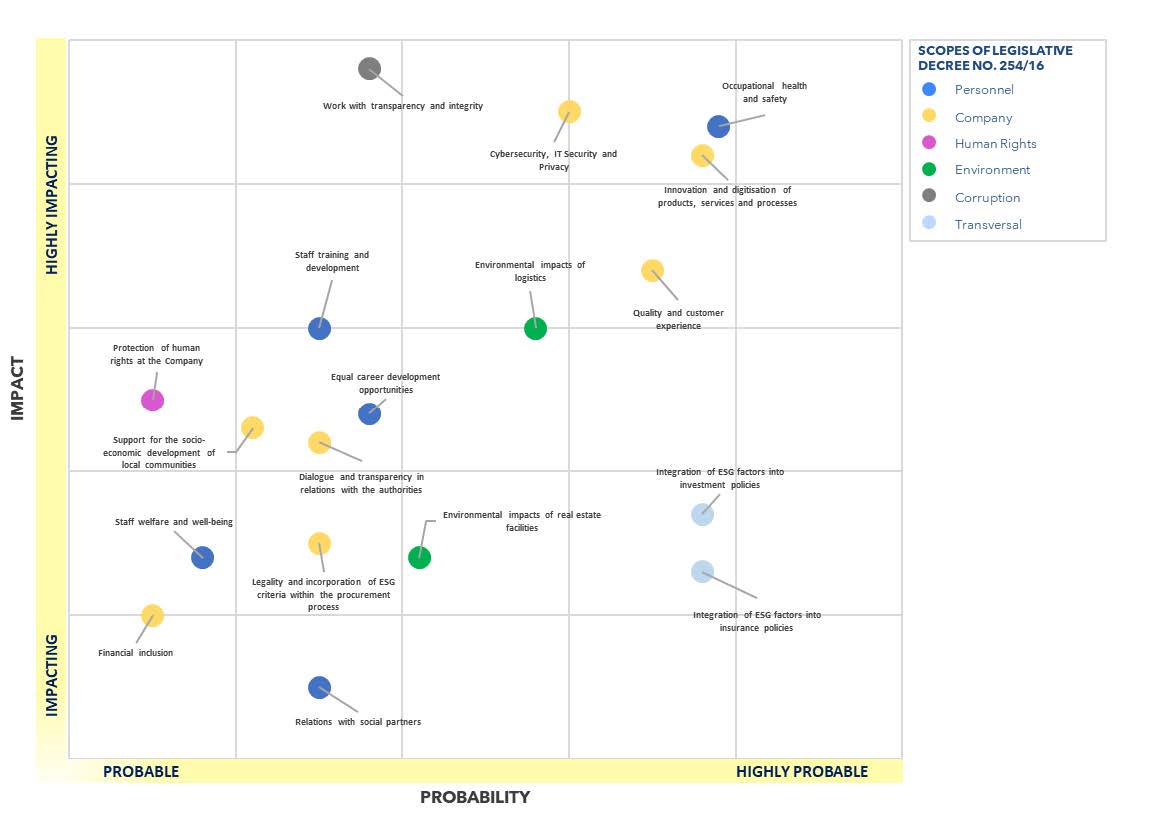|
Integrity and transparency
|
Work with transparency and integrity
|
Behaviours adverse
to proper business
management
standards
|
Personnel; Suppliers and
business partners;
Financial community;
Customers;
Independent
regulatory and/or
supervisory authorities
|
- Strategic
- Reputational
- Compliance
|
- Economic
|
Reinforcement of corporate
controls on specific
issues (e.g. integrated
risk management model,
corporate reliability
model, anti-corruption,
environment, etc.)
|
|
Legality and
incorporation of
ESG criteria within
the procurement
processes
|
Behaviour of suppliers
not in line with Poste
Italiane’s sustainability
policies
|
Suppliers and
business partners
|
- Strategic
- Operational
- Reputational
- ESG
|
- Health and safety
- Human rights
|
- “Open and Transparent
Contracts” portal
- Centralisation of Group
companies’ procurement
activities within a corporate
function
- Supplier qualification
system
|
|
People development
|
Staff training and
development
|
Inadequate staff
quality
|
Customers;
Poste Italiane people
|
- Strategic
|
- Human rights
|
- Strengthening of annual
training plan
- Promotion of
communication, training
and information initiatives to
increase engagement
-
Consolidation of the Poste Italiane Development System
|
|
Staff welfare and
wellbeing
|
Inadequate planning
and/or implementation
of staff welfare
and wellbeing
programmes
|
Poste Italiane people
|
- Strategic
- ESG
|
- Health and safety
- Quality of life,
wellbeing
|
- Staff engagement
programmes (e.g.
“employee engagement
programme”, activation
of a welfare platform, an
absenteeism competence
centre, etc.)
- Incentivisation of the use of
remote working tools
-
Financial and non-financial benefits for personnel
|
|
Relations with
social partners
|
Labour union disputes
|
Labour Unions;
non-recognised workers’organisations;
Financial community
|
- Economic
- Strategic
- Operational
- Reputational
|
- Economic
- Health and safety
- Human rights
- Quality of life,
wellbeing
|
- Constant dialogue with
labour union representatives
- Implementation of
restructuring projects
in compliance with the
regulatory framework
(National Collective Labour
Contract and laws), which is
characterised by governable
social impacts
- Management of staff in line
with legal requirements,
policies and Company
procedures
|
|
Occupational
health and safety
|
Accidents / workplace
injuries involving
employees or
contractors
|
Poste Italiane people
|
- Economic
- Strategic
- Reputational
- Operational
|
- Health and safety
|
- Analysis and optimisation
of occupational health
and safety organisational
models
- Extension of production
models to operational sites
(e.g. lean manufacturing)
-
OHSMS certification in the production units of both Poste Italiane SpA and of Group Companies
|
|
Diversity and Inclusion
|
Protection of human rights at the Company
|
Possible
discrimination
against Poste Italiane
employees (e.g.
gender, age, political or sexual orientation,
marital status, etc.)
|
Poste Italiane people
|
- Strategic
- Reputational
- ESG
|
- Human rights
|
- Specific organisational
responsibility for diversity
and inclusion
- Identification of possible
training initiatives to create
culture for all staff
- Introduction of control
mechanisms for the
protection of human
rights, equal opportunities,
diversity and inclusion
|
|
Equal career
development
opportunities
|
Lack of transparency
in communication
and application of
objective assessment
drivers in employees’
career paths
|
Poste Italiane people;
Labour Unions; Non-recognised workers’
organisations
|
- Strategic
- Reputational
|
- Human rights
- Quality of life,
wellbeing
|
- Introduction of control
mechanisms for the
protection of human
rights, equal opportunities,
diversity and inclusion
- Promoting an inclusive business culture aimed at guaranteeing equal opportunities are respected
- Ongoing dialogue with Employees
|
|
Creating value for the country
|
Support for the
socio-economic
development of
local communities
|
Tensions with local
communities due to redefinition of the business model
|
Local authorities
|
- Strategic
- Reputational
|
- Quality of service
- Economic
|
- Constant structured
dialogue with bodies and
authorities and agreed local
community engagement
initiatives
|
|
Dialogue and
transparency in
relations with the
authorities
|
Failure to take into
account authorities’
expectations
|
Independent
regulatory and/
or supervisory
authorities; European
and international
authorities; National
authorities; Consumer
and trade associations
|
- Strategic
- Reputational
|
- Economic
|
- Constant structured
dialogue with bodies and
authorities and agreed local
community engagement
initiatives
|
|
Financial
inclusion
|
Insufficient
consideration
regarding access to financial services by
specific customer
categories (e.g. the
elderly, foreigners,
etc.)
|
Financial Community;
Customers; Entities
and Institutions
|
- Strategic
- ESG
|
- Economic
|
- Constant structured
dialogue with bodies and
authorities and agreed local
community engagement
initiatives
- Digital and postal financial
education programme
|
|
Green transition
|
Environmental
impacts of
logistics
|
Environmental
externalities of
logistics activities (e.g. production of polluting emissions)
|
Suppliers and
business partners;
Environment
|
- Strategic
- ESG |
- Health and safety
|
- Making the Postal,
Communications and
Logistics fleet “green”,
partly with the aim of
increasing load capacity
-
Development of the delivery network (e.g. increase in the number of afternoon delivery lines, introduction of deliveries to lockers, Post Offices and third-party networks, smart letter boxes)
- Specific organisational responsibility for the management of the company fleet
|
|
Environmental
impacts of real
estate facilities
|
Increased emissions
from real estate
management (e.g.
energy management,
waste management,
etc.)
|
Environment; Poste
Italiane people
|
- Economic
- Strategic
- Reputational
- ESG
|
- Health and safety
|
- Specific organisational
responsibility for the
management of the
company fleet
- Adoption of energy
efficiency solutions for real
estate assets and use of
renewables
- Implementation of the
Environmental Management
System for Group
companies
|
|
Customer experience
|
Quality and
customer
experience
|
Deterioration in the
levels of quality
provided and increase in the number of
complaints
|
Customers;
Independent
regulatory and/
or supervisory
authorities; Financial
community
|
- Economic
- Strategic
- Reputational
- Operational
|
- Quality of service
- Economic
|
- Strengthening of Company
initiatives regarding specific
issues (e.g. quality)
- Improvement of products
and services
- Development of customer
assistance model
- Complaints management
- Implementation of the
Quality Management
System
|
|
Cybersecurity,
IT security and
privacy
|
Increase in
malfunctions relating to technological
infrastructure
|
Poste Italiane people;
Media; Customers
|
- Economic
- Strategic
- Operational
- Reputational
|
- Quality of service
- Economic
|
-
Risk and control management model in the scope of privacy, cyber security and business continuity
- Investments in IT infrastructure modernisation
|
|
Innovation
|
Innovation and
digitisation of
products, services
and processes
|
Insufficient innovation
capacity in multichannel,
customer
experience and digital areas
|
Financial community;
Customers;
Community and
territory
|
- Strategic
|
- Quality of service
- Economic
|
- Specific organisational
responsibility for digital
development
-
Launch of digital initiatives (products, services and business models)
- Partnerships and
collaborations with first
mover realities in the digital
and technological sector
|
|
Sustainable finance
|
Integration of
ESG factors
into investment
policies
|
Lack of perception
of the overall risk of operations and loss of business opportunities
|
Financial community;
Customers
|
- Financial and
insurance
- ESG
|
- Economic
- Human rights
|
- Management of risks and
opportunities relating to ESG
factors within traditional
investment processes
|
|
Integration of
ESG factors into
insurance policies
|
Lack of perception
of the overall risk of operations and loss of business opportunities
|
Financial community;
Customers
|
- Financial and
insurance
- ESG
|
- Economic
- Human rights
|
- Management of risks and
opportunities relating to ESG
factors within traditional
insurance processes
|





